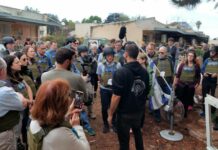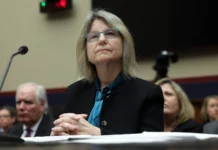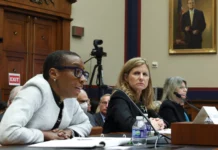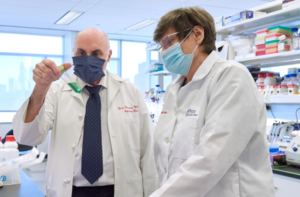
Sharon Taffet has been friends with immunologist and University of Pennsylvania Roberts Family Professor in Vaccine Research Dr. Drew Weissman for 22 years.
Every time she asked his wife how he was doing, Taffet got the same response: “She would always say, ‘Oh, Drew’s busy saving the world.’ It was the same answer for years,” said Taffet, who is Weissman’s administrative coordinator. “The answer was fascinating because nobody could ever have known how true it would turn out to be.”
On Nov. 30, the Franklin Institute announced that Weissman, along with colleague and neurosurgery Professor Katalin Karikó, were among the 2022 recipients of the Benjamin Franklin Medal in Life Science for their contributions to research on RNA that shaped the creation of the Moderna and Pfizer BioNTech COVID-19 vaccines. The award will be presented in May.
In September, the duo won the Lasker-DeBakey Clinical Medical Research Award for their research on the COVID vaccine and the Breakthrough Prize for prior research on the use of RNA treatments for cancer and sickle cell anemia.
Since the COVID vaccine has been in use, Weissman and Karikó have won nearly a dozen awards for their RNA research, which allowed for RNA to become usable and more potent in the use of vaccines and treatments.
RNA vaccines are easier to make than other vaccine types because the isolation and replication of the specific virus is not necessary in the creation. However, making RNA a viable tool was not possible before Weissman and Karikó’s research.
“When we gave RNA as an injection into a mouse, the mice got sick,” Weissman said. “It was because the RNA was inflamed. What we figured out is that our body uses RNA to distinguish pathogens from cells. So it detects viruses, bacteria, other parasites, other pathogens, mainly, but not exclusively, on their RNA.”
By changing one of the four bases, or letters, in RNA, the researchers were able to make RNA non-inflammatory, a discovery they made in 2005. Once Weissman and Karikó learned of the coronavirus’ particular protein sequence in 2020, they, along with Moderna and Pfizer, were able to quickly adapt an RNA vaccine to combat the virus. They had been concerned about COVID since hearing about it in October 2019.
“We were already talking, and we were already concerned because, to us, it appeared that it was spreading rapidly,” Weissman said. “It appears to be a brand-new infection, so we were concerned that it could turn into something worse.”
But even before the onset of the pandemic, the pair were in the middle of five clinical trials on various RNA vaccine treatments. Their lab wasn’t always as fruitful as it is today.
“Katie [Karikó] and I were studying RNA when most other people weren’t interested,” Weissman said. “Katie and I went on for 20 plus years with no funding. People wouldn’t publish our papers; people weren’t interested in RNA, and we just kept going because the data and the hope was there.”
Weissman and Karikó met competing for use of the photocopier at the University of Pennsylvania in 1997.
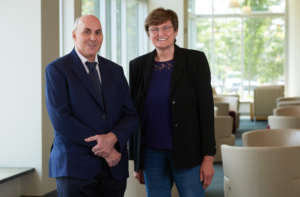
Weissman came to Penn from the National Institute of Allergy and Infectious Diseases led by then-Director Dr. Anthony Fauci. He became a doctor of medicine and received his doctorate in immunology and microbiology from the University of Boston in 1987, having earned his bachelor’s and master’s degrees from Brandeis University in 1981, where he met his wife Mary Ellen Weissman.
Karikó is not an immunologist by trade; rather, she has her training in biochemistry, receiving both her bachelor’s and doctorate from József Attila University in Hungary.
“Katie and I are very different people,” Weissman said. “Katie is very emotional and reactive; I’m very quiet, even-keeled, non-emotional.”
But despite their differences, the two have maintained a two-and-a-half-decade partnership.
“The critical thing is we’re both open-minded and inquisitive; we don’t take things for granted,” Weissman said.
Their research together has had a profound change on the world, senior Weissman laboratory member and Adjunct Assistant Professor of Medicine Dr. Elena Atochina-Vasserman said.
When the duo developed the RNA technology, Atochina-Wasserman said, it was like showing someone with a rotary phone the new iPhone — it was a device that didn’t just improve how calls were made; it fundamentally changed how someone moved through the world.
“Twenty years from now, every single young person will know that Drew Weissman, ‘revolutionary,’ changed their life,” Atochina-Vasserman said.
Weissman always had an interest in the sciences. He originally wanted to pursue engineering, which he said is similar to the “basic sciences.”
“It’s creation and understanding,” he said.
Weissman’s empirical sensibilities were there from day one, he said. He was raised by a Jewish father and an Italian non-Jewish mother who never converted. He grew up celebrating all the Jewish holidays — and still does with Mary Ellen Weissman, who was raised observant, and his children who attended Temple Beth Hillel/Beth El in Wynnewood with Taffet’s daughter — but his family was not religious, he said.
“I’m more of a Daoist, in that point of view that I think that Earth, nature is the supreme — the main component of life. And that’s what needs to be celebrated.”
Since the rollout of the vaccine, Weissman has received hundreds of letters applauding his success. People have asked for his autograph.
Though his and Karikó’s impact has been felt all over the world, Weissman has also changed the lives of those close to him.
Taffet remembered receiving her first dose of the COVID vaccine earlier this year. When she got her shot, she thought of Weissman.
“The entire time, the entire time,” Taffet said. “The first emotion that I felt was intense pride … and then incredible gratitude.”
[email protected]; 215-832-0741



